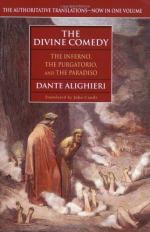Thus, tears and sighs forth gushing, did I burst
Beneath the heavy load, and thus my voice
Was slacken’d on its way. She straight began:
“When my desire invited thee to love
The good, which sets a bound to our aspirings,
What bar of thwarting foss or linked chain
Did meet thee, that thou so should’st quit the hope
Of further progress, or what bait of ease
Or promise of allurement led thee on
Elsewhere, that thou elsewhere should’st rather wait?”
A bitter sigh I drew, then scarce found voice
To answer, hardly to these sounds my lips
Gave utterance, wailing: “Thy fair looks
withdrawn,
Things present, with deceitful pleasures, turn’d
My steps aside.” She answering spake:
“Hadst thou
Been silent, or denied what thou avow’st,
Thou hadst not hid thy sin the more: such eye
Observes it. But whene’er the sinner’s
cheek
Breaks forth into the precious-streaming tears
Of self-accusing, in our court the wheel
Of justice doth run counter to the edge.
Howe’er that thou may’st profit by thy
shame
For errors past, and that henceforth more strength
May arm thee, when thou hear’st the Siren-voice,
Lay thou aside the motive to this grief,
And lend attentive ear, while I unfold
How opposite a way my buried flesh
Should have impell’d thee. Never didst
thou spy
In art or nature aught so passing sweet,
As were the limbs, that in their beauteous frame
Enclos’d me, and are scatter’d now in
dust.
If sweetest thing thus fail’d thee with my death,
What, afterward, of mortal should thy wish
Have tempted? When thou first hadst felt the
dart
Of perishable things, in my departing
For better realms, thy wing thou should’st have
prun’d
To follow me, and never stoop’d again
To ’bide a second blow for a slight girl,
Or other gaud as transient and as vain.
The new and inexperienc’d bird awaits,
Twice it may be, or thrice, the fowler’s aim;
But in the sight of one, whose plumes are full,
In vain the net is spread, the arrow wing’d.”
I stood, as children silent and asham’d
Stand, list’ning, with their eyes upon the earth,
Acknowledging their fault and self-condemn’d.
And she resum’d: “If, but to hear
thus pains thee,
Raise thou thy beard, and lo! what sight shall do!”
With less reluctance yields a sturdy holm,
Rent from its fibers by a blast, that blows
From off the pole, or from Iarbas’ land,
Than I at her behest my visage rais’d:
And thus the face denoting by the beard,
I mark’d the secret sting her words convey’d.




